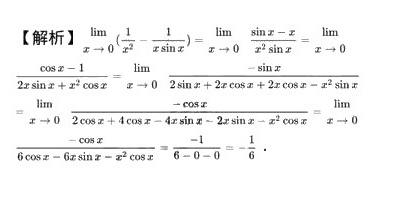题目
[题目] lim _(xarrow 0)(dfrac (1)({x)^2}-dfrac (1)(xsin x))

题目解答
答案

解析
考查要点:本题主要考查极限的计算,涉及分式运算、等价无穷小替换、泰勒展开或洛必达法则的应用。
解题核心思路:
- 通分合并:将两个分式合并为一个分式,化简表达式。
- 处理不定式:分子和分母均为无穷小量,需通过泰勒展开或洛必达法则进一步化简。
- 极限计算:利用展开式或多次求导,最终求得极限值。
破题关键点:
- 识别0/0型不定式,选择合适的方法(泰勒展开或洛必达法则)。
- 正确展开或求导,避免计算错误。
步骤1:通分合并分式
原式为:
$\lim _{x\rightarrow 0}\left(\dfrac {1}{{x}^{2}}-\dfrac {1}{x\sin x}\right)$
通分后得:
$\lim _{x\rightarrow 0} \dfrac{\sin x - x}{x^2 \sin x}$
步骤2:分析分子和分母的阶
当$x \rightarrow 0$时,$\sin x \sim x - \dfrac{x^3}{6}$,因此:
- 分子:$\sin x - x \sim -\dfrac{x^3}{6}$
- 分母:$x^2 \sin x \sim x^2 \cdot x = x^3$
此时分子和分母均为$x^3$阶无穷小,属于0/0型不定式。
步骤3:泰勒展开法
将分子和分母展开至足够阶数:
- $\sin x = x - \dfrac{x^3}{6} + o(x^3)$
- 分子:$\sin x - x = -\dfrac{x^3}{6} + o(x^3)$
- 分母:$x^2 \sin x = x^2 \left(x - \dfrac{x^3}{6} + o(x^3)\right) = x^3 - \dfrac{x^5}{6} + o(x^5)$
因此,原式化简为:
$\lim _{x\rightarrow 0} \dfrac{-\dfrac{x^3}{6} + o(x^3)}{x^3 - \dfrac{x^5}{6} + o(x^5)} = \lim _{x\rightarrow 0} \dfrac{-\dfrac{1}{6} + o(1)}{1 - \dfrac{x^2}{6} + o(x^2)} = -\dfrac{1}{6}$
步骤4:洛必达法则验证
对原式应用洛必达法则两次:
- 第一次求导:
分子导数:$\dfrac{d}{dx}(\sin x - x) = \cos x - 1$
分母导数:$\dfrac{d}{dx}(x^2 \sin x) = 2x \sin x + x^2 \cos x$
极限变为:
$\lim _{x\rightarrow 0} \dfrac{\cos x - 1}{2x \sin x + x^2 \cos x}$ - 第二次求导:
分子导数:$\dfrac{d}{dx}(\cos x - 1) = -\sin x$
分母导数:$\dfrac{d}{dx}(2x \sin x + x^2 \cos x) = 2\sin x + 2x \cos x + 2x \cos x - x^2 \sin x$
极限变为:
$\lim _{x\rightarrow 0} \dfrac{-\sin x}{2\sin x + 4x \cos x - x^2 \sin x} = \dfrac{0}{0}$ - 第三次求导:
分子导数:$\dfrac{d}{dx}(-\sin x) = -\cos x$
分母导数:$\dfrac{d}{dx}(2\sin x + 4x \cos x - x^2 \sin x) = 2\cos x + 4\cos x - 4x \sin x - 2x \sin x - x^2 \cos x$
代入$x=0$得:
$\dfrac{-\cos 0}{2\cos 0 + 4\cos 0} = \dfrac{-1}{6} = -\dfrac{1}{6}$